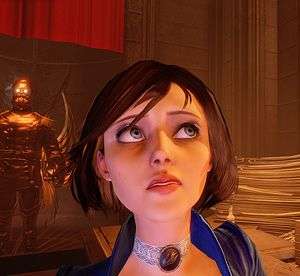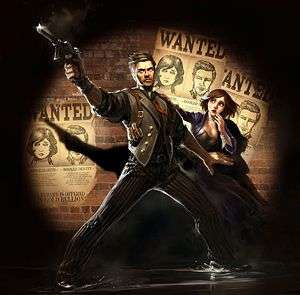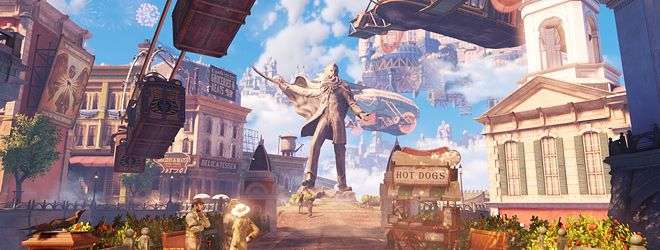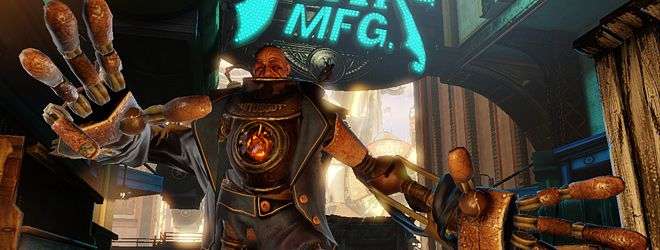Best of 2013: BioShock Infinite – An Alternate View
by Ian
First Published: May 16, 2013
Voted For By: Ed, Tim
Reason(s) for Vote:
I’m often accused by friends who don’t read my articles or reviews of disliking popular things because I need to be different, and no matter how many times I eloquently explain why I think Breaking Bad is the most over-rated and average show I’ve ever seen in my entire life, diagrams et al, they refuse to believe me. I’ll admit that when I first saw the title of Ian’s article that I expected something akin to some of the more terrible, attention-seeking “counter-arguments” I’ve seen of the greatest FPS I’ve ever played. So, really, what I want to do is use this to apologise, because not only was I absolutely wrong, but I feel sorry for even doubting Ian for a second. It’s an amazing article and something I wish I could write more of, because like Ronseal, it does exactly what it says on the tin – providing another viewpoint that doesn’t chastise or clutch at straws, but left me perfectly able to see where he was coming with incredibly well-reasoned arguments and ideas that I’d never have thought of. I still think it’s the best FPS I’ve ever played, but it allowed me to call off the torches and pitchforks shortly before they did anything more than collateral damage to Ian’s home and his belongings. Although, I am sorry about what they did to your cat, that’s my bad. – Ed
As dumb as it is to say, the best opinion pieces are the ones that don’t fully align with your own and thus allow you to have a constructive mental argument with yourself as to why that is. Ian raises some valid points about BioShock Infinite’s shortcomings, and even if you are able to overlook them more than he is, it’s still important to hear both sides of the argument. – Tim
————————————————————————————————————————————————————–
 Let’s get this straight from the beginning – BioShock Infinite is a fantastic experience. It builds a world that you can invest in, emotionally and intellectually, with well-written characters that you can believe in and connect with. I’d go so far as to say that it’s perhaps the first game since Half Life 2 to completely immerse you in its world.
Let’s get this straight from the beginning – BioShock Infinite is a fantastic experience. It builds a world that you can invest in, emotionally and intellectually, with well-written characters that you can believe in and connect with. I’d go so far as to say that it’s perhaps the first game since Half Life 2 to completely immerse you in its world.
And yet… and yet. Something doesn’t quite sit right; there is a fly in the ointment, if you will. Having given myself some time to reflect on the game, on everything that happened, on that ending (don’t worry, no spoilers here), I feel that there is a blot on the score sheet. As stated earlier, BioShock Infinite is a great experience… but I’m not convinced that it’s a great game.
The first hour or two had me rapt; Columbia is beautiful – there’s no other word for it. The way that the light spills lazily over the landscape, softening the surroundings to an almost-heavenly vision, the slight over-saturation of the colours giving the world something of a dream-like quality… it’s stunning, and this immediate prettiness drew me in like nothing before. Technically speaking, the engine is nothing to write home about (frankly, the faces of the NPCs downright scare me), but the art direction carries this to another level.
“But Ian”, I can’t hear you say, “We know all this! You said there’s a fly in the ointment, but you’re waxing lyrical!” Well yes, but I’m building up to it. I am painting a picture! Hush now, and all will become clear.
You see, this easing in to the game encouraged me to invest in the world; it made me want to know what happens next. The first fight came and went (‘melée executions – cool!’), and I was introduced to Elizabeth, this most enchanting young girl, naïve yet fiercely intelligent at the same time. I immediately wanted to know more. I wanted to know her story.
 This is where I introduce the bugbear. The game kept getting in the way. I realise this may sound a bit silly, but think about it. To me, the strength of Infinite is in its building of the relationship between Elizabeth and Booker, the backdrop that Columbia provides, the background of the proletariat rising up against the establishes classes, and the overt discussion of religion’s place in society. Those were the things that drove me on, yet I nearly didn’t get to experience them all, almost giving up on the game half way through.
This is where I introduce the bugbear. The game kept getting in the way. I realise this may sound a bit silly, but think about it. To me, the strength of Infinite is in its building of the relationship between Elizabeth and Booker, the backdrop that Columbia provides, the background of the proletariat rising up against the establishes classes, and the overt discussion of religion’s place in society. Those were the things that drove me on, yet I nearly didn’t get to experience them all, almost giving up on the game half way through.
I may now start to overuse the word ‘disconnect’, because this was the overriding thought I had after a few hours of Infinite. I’d spend a little time wandering around Columbia, interacting with Elizabeth, observing life going on around me… and then, suddenly, everything changed.
Now, instead of the convincing world of Columbia, I was in an arena-shaped area… all the NPCs had suddenly vanished. Enemies were running at me from all angles. ‘Ahh’, I thought, ‘this must be the game part.’ Realising this brought a jarring disconnect between the world I’d become so invested in, and the parts that had to be included to justify it as a game. The transition between game and narrative was stark, shaking me out of my immersion in the world, back to thinking, ‘right, hit Q, switch vigor, fire at that guy, take cover, reload, RELOAD!’
This disconnect (told you) happened again and again, to the point where I became bored with the game. Story, interaction, arena, shooting, recover, arena, shooting. I could go in to some specific criticism (Handymen!), but it would be unfair, because I did thoroughly enjoy Infinite… just not the game part.
It felt to me as if the shooty-gun-explosiony bits were designed by a completely separate team to the talky-narrative-emotiony bits – in fact, it felt like it had been outsourced to the Quake team. “Hey, Team Quake! We’re really busy crafting one of the finest game experiences of the decade and are too busy to make any actual gameplay. Could you knock together some generic shooty bits that we can stick in between our talky bits to justify this actually being a game? Thanks!”
 Don’t get me wrong… the gunplay was fairly enjoyable in and of itself, but it was nothing that hadn’t been seen before. If it hadn’t been married to the rest of Infinite, it wouldn’t have come close to being acclaimed. Think about it… of all the pieces you’ve read about the BioShock Infinite, how much has actually been written about the game part?
Don’t get me wrong… the gunplay was fairly enjoyable in and of itself, but it was nothing that hadn’t been seen before. If it hadn’t been married to the rest of Infinite, it wouldn’t have come close to being acclaimed. Think about it… of all the pieces you’ve read about the BioShock Infinite, how much has actually been written about the game part?
The problem here, though, is that without the jarringly-out-of-place shooty bits, the terrifically-realised narrative wouldn’t live. This isn’t a narrative that would have seen the light of day in a film, and certainly wouldn’t have had the same impact. For Infinite to work, you need to be alongside Elizabeth; you need to be in the world, to be experiencing it first hand. Perhaps Infinite shows that gaming has finally reached its awkward growing pains phase where it’s maturing, trying to present compelling experiences, yet still shackled by customer expectation of what ‘a game’ is.
Is there a solution to this? Probably. Do I know what it is? Not on your nelly. What I do know is that there has to be an evolution. For all that made Infinite excellent – and I am incredibly glad that I stuck with it to the end – it also felt like watching Citizen Kane, while pausing every ten minutes to play a round of Angry Birds. Until narrative and gameplay can be successfully merged together, this disconnect between interaction and narrative will remain.
Last five articles by Ian
- Shooting Stars - Review
- Sora - Review
- Early Access - Epistory, Ironkraft, and Zombasite
- 1849 - Preview and Interview
- Diablo III: Reaper of Souls - Review





















There are no comments, yet.
Why don’t you be the first? Come on, you know you want to!